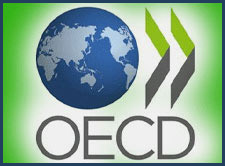
Weaker conditions in advanced economies, including the effects of "Brexit", have offset a gradual improvement in emerging market commodity producers as the world economy entered a low-growth trap amid weak trade and financial distortions, the Organisation for Economic Co-operation and Development said Wednesday, while trimming the global growth projections.
"Overall, the world economy remains in a low-growth trap with persistent growth disappointments weighing on growth expectations and feeding back into weak trade, investment, productivity and wages," the Paris-based think tank said in its Interim Economic Outlook.
OECD reduced the global growth forecast for this year to 2.9 percent from 3 percent predicted in June and the projection for next year was trimmed to 3.2 percent from 3.3 percent.
The modest reduction in the global growth forecast mirrored the downgrades in major advanced economies, notably the United Kingdom for 2017, offset by a gradual improvement in major emerging-market commodity producers.
"Monetary policy has become overburdened and is creating distortions in financial markets," the OECD said. "Monetary policy has created a window of low interest rates. Fiscal policy should take advantage of the increase in fiscal space to increase growth enhancing spending."
The group also stressed on the need to intensify structural reform momentum. Poor growth outcomes combined with high inequality and stagnant incomes are further complicating the political environment, making it more difficult to pursue policies that would support growth and promote inclusiveness, the report said.
The U.S.' growth forecast for this year was lowered to 1.4 percent from 1.8 percent and the projection for next year was cut to 2.1 percent from 2.2 percent.
Despite solid consumption and job growth, U.S. growth slowed due to weak investment, partly reflecting developments in the energy sector, and a prolonged inventory correction, the OECD said. Demand growth is expected to improve next year, but remain below historical standards.
The growth projection for the U.K. for next year was halved to 1 percent, while the forecast for this year was boosted to 1.8 percent from 1.7 percent.
"Uncertainty about the future path of policy and the reaction of the economy remains very high and risks remain to the downside," the OECD said. "Spillovers to the global economy, notably the euro area, have been modest so far…more negative effects on the euro area are likely to become apparent in 2017."
Eurozone's growth forecast for this year was trimmed to 1.5 percent from 1.6 percent and the projection for next year was slashed to 1.4 percent from 1.7 percent.
High nonperforming loans in some euro area countries continue to hold back growth prospects and the significant slack in the labor market remains amid few signs of inflation and wage pressures, the report said.
Among the major euro area economies, Germany's growth projection for this year was raised to 1.8 percent, while the outlook for next year was cut to 1.5 percent. Both France and Italy saw their projections for the two years trimmed.
Canada's growth forecasts for this year and next were lowered to 1.2 percent and 2.1 percent, respectively. Japan's outlook for this year was cut to 0.6 percent, while the projection for next year was raised to 0.7 percent.
Among the emerging market economies, China's growth projections for this year and next were retained at 6.5 percent and 6.2 percent, respectively. India's growth forecasts were also retained at 7.4 percent for this year and 7.5 percent for 2017.
Meanwhile, Brazil was the only country set to experience an economic contraction this year, the severity of which is expected to lessen sharply next year, yet stuck in recession. GDP was forecast to shrink 3.3 percent this year and 0.3 percent next year.
"The sharp slowdown in world trade underlines concerns about the robustness of the economy and the difficulties in exiting the low-growth trap," OECD Chief Economist Catherine Mann said.
"While weak demand is surely playing a role in the trade slowdown, a lack of political support for trade policies whose benefits could be widely shared is of deep concern."
by RTT Staff Writer
For comments and feedback: editorial@rttnews.com
Business News

